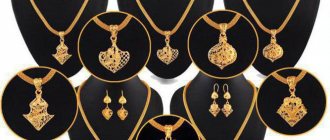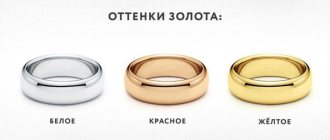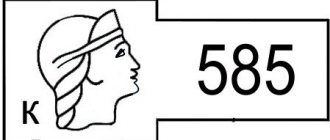►
watch video
►
gold educational program
►
gold price forecast
Buying and selling precious metals in Russia involves the need to pay various taxes, depending on the chosen investment option. Profit from an investment, taking into account taxation, can be completely negated if this issue is not worked out in advance. Before deciding on a gold investment option, you need to carefully study the following information:
- Type of gold tax corresponding to the chosen investment method.
- Possible methods of reducing tax burden when buying and selling precious metals.
- How to sell gold without VAT within the framework of current legislation.
VAT accompanying the purchase of gold
Government taxes on gold investments are required to be paid when you:
- you purchase bullion from a bank - the price will already include VAT, and in fact you will pay 20% more for the purchase;
- If you purchase coins made of precious metals that are not included in the official means of payment of the issuing country, you will have to pay VAT when purchasing gold. If, on the contrary, you sell precious metal to a bank, then there is no need to pay VAT.
Deputy Minister of Finance of the Russian Federation Alexey Moiseev named the condition for the abolition of VAT on investment gold
VLADIVOSTOK, September 2 – PRIME. It is possible to cancel VAT on investment gold in Russia only if there is absolutely transparent circulation of the precious metal in the electronic traceability system, Deputy Minister of Finance of the Russian Federation Alexey Moiseev said in an interview with RIA Novosti on the eve of the Eastern Economic Forum.
The lawyer told how to save your home from scammers
In Russia, in 2021, the State Integrated Information System in the field of control over the circulation of precious metals and precious stones (GIIS DMDK) began operating, which is designed to make the market transparent, as well as transfer all business processes in this area to a digital format. The sale of unmarked jewelry should be prohibited from March 1, 2024.
“We were instructed to cancel VAT on investment gold, but only when we ensure its absolutely transparent circulation in the electronic traceability system. What is it for? Nobody is going to cancel VAT on jewelry. It would be crazy that we charge VAT on clothes, but don’t charge VAT on jewelry. The risk is that if we abolish VAT on some part of gold, then this tax-free gold will flow into the jewelry industry. Which, unfortunately, is now happening through various fraudulent schemes,” Moiseev said.
“Accordingly, the task of GIIS is to separate investment gold completely from gold that is used by domestic industry. We will have to show that the system is fully operational, the Federal Tax Service will have to make sure that the turnover is completely transparent, and then we will come to the question of Let's see, there are different points of view here. The question is whether we need to wait for a complete ban on unmarked jewelry.”
He added that the Ministry of Finance would like to introduce the ban earlier, but went along with the industry. “Let’s see how the system with data from refineries works now. Everyone is afraid that failures may occur. Can I now say that there will definitely not be a single failure? Of course I can't. Therefore, we need to see how the system will work. We are trying to make everything smooth and smooth,” he explained.
Prices for sunflower oil will be “released” in Russia
“The most important message that we convey to the industry is that for all legal manufacturers, marking is a benefit, because now it is impossible to distinguish a product that is made with a real mark, which really contains as much gold as is stated, from a product that is made somewhere on knee, in which the gold is only half of what was declared and where there is a false stamp. We know very well that in some EAEU countries there is even a business of counterfeiting Russian stamps. There are places where you can come and say: I want sample “585” or some other,” Moiseev noted.
The Eastern Economic Forum (EEF) takes place on September 2-4 on the campus of the Far Eastern Federal University in Vladivostok. RIA Novosti acts as the general information partner of the EEF.
Read the full text of the interview on the website ria.ru at 8.00 Moscow time.
Personal income tax associated with the sale of gold
Personal income tax must be paid when selling precious metals from a brokerage account, as well as when selling gold coins or bars. Its size is 13%. There are various possibilities to reduce or even completely avoid paying this tax on gold investments.
Firstly, if you have owned a precious metal for more than three years and are in no hurry to sell it, then you are entitled to a tax benefit that exempts you from paying personal income tax.
If the period of ownership of the precious metal is less than three years, there is an option to use the property deduction for sale. The fact is that gold metal is the same property as a house or car, and paragraph 2 of Article No. 130 of the Civil Code of the Russian Federation gives you the right to appropriate preferential taxation.
There are two ways to reduce the gold tax:
- Reported income from the sale of precious metal can be reduced by the amount of expenses incurred, calculated by the purchase price of the yellow metal.
- Tax losses can be offset by a possible annual deduction for the sale of property in the amount of 250,000 rubles.
For example, you made a purchase of gold in the form of an investment in an impersonal metal account in the amount of 100,000 rubles. After a year, you managed to sell the precious metal at twice the price. — What is the best way to pay taxes on investments in gold? If the money acquired from the sale is reduced by the amount of costs, the net income will be 100,000 rubles. The tax on this amount will be 13,000 rubles. It is possible to take advantage of the property deduction and not pay taxes on gold at all. But only if the amount of profit from the sale of the precious metal is less than 250,000 rubles.
In this case, it is better to use the scheme described below.
Suppose someone purchased gold using an impersonal metal account in the amount of 300,000 rubles. The following year, the cost of the precious metal increased to 400,000 rubles. The sale will provide an income of 100,000 rubles, and the tax will be 13,000 rubles (personal income tax 13%).
The property tax deduction only applies to 250,000. On the balance of 150,000 you will have to pay a tax of 19,500 rubles upon sale.
As you can see, in this case, paying personal income tax according to the usual scheme is much more profitable than using property deductions.
What does the abolition of the gold tax give?
The main thing that the abolition of the gold tax in Russia gives is alternativeness and greater interest. What we mean here is that investing in gold becomes much more interesting, pushing the purchase of currency into the background.
Even despite the times when gold prices have fallen since 2013, today they have restored their previous positions. Plus, the upward trend can be confirmed by the fact that the volume of gold purchased by Russians is increasing.
And citizens have long needed a worthy alternative to currency as a means of saving and investing.
“What’s wrong with dollars?” you ask. It's simple! The yield on dollars (bank deposits) is declining. The stakes are getting lower and lower.
At the same time, a person has a peculiar addictive effect.
Addiction kicks in precisely at the moment when the situation with currency and deposits worsens: You wanted to receive, for example, X% per annum in Russian rubles. But due to the worsening situation, you can actually receive only half of the planned interest.
This pushes a person to search for new investment options. And why reinvent the wheel or consider investing in stocks, bonds, etc., if there is a simple and reliable option - gold?!
Why? Because we should not forget that historically, gold was one of the most popular investment instruments. The share of gold purchases by investors accounted for approximately 35-45% of the total volume (the same or slightly more for jewelers).
But it was precisely the tax, the abolition of which we finally waited for, that did not give investors the opportunity to make profitable investments.
What exactly will tax abolition do?
The abolition of the gold tax in our country will bring many, hopefully, positive changes. Namely:
- A powerful impetus to the development of the gold mining industry in the Russian Federation. If previously (before the adoption of the law) mining companies did not have the right to export pure gold and were dependent on the Central Bank and other large financial institutions, today they were given the green light. The market is expanding.
- Return of capital to the country. What kind of capital are we talking about? About the funds of citizens who wanted to invest in bullion.
- Increasing volume of gold bullion purchases. Experts believe that Russians will purchase 10-15 times more tons of gold bars per year than before. Now this figure is approximately 3-5 tons. The planned increase is at least up to 50 per year.
- Increase in revenues to the state treasury. The banking sector (even with the smallest % premium) sends about 25 million to the budget from each ton of precious metal sold. Income tax. If the planned increase in the volume of gold purchases is 50 tons, then the state will receive approximately 1.5 billion rubles. And this is not to mention the fact that revenues from mining companies will be in the range of 6.2 billion Russian rubles. This inevitably guarantees the development and growth of the economy of such a great power as the Russian Federation.
What is important to know about taxes on gold when buying and selling it
- When buying or selling precious metal through brokerage houses or banks, completing and filing a tax return is the responsibility of the investor.
- If the investor has owned the precious metal for less than three years, then a return must be filed, even if the estimated tax is zero.
- The moment of purchase or sale, as well as the costs incurred, must be documented.
- In recent years, the government has been considering, but will not accept, changes to legislation related to the abolition of VAT for individuals when purchasing gold bullion.
Taxes when investing in gold through ETFs
Securities of gold ETFs are not classified as property assets. Therefore, personal income tax of 13% will apply only to the income received upon sale. A tax reduction in this case is possible in the following cases:
- ETF securities are owned by the investor for less than three years, which reduces the amount subject to gold tax by 3,000,000 rubles for each year.
- The purchase of ETF assets was made into an individual investment account of the second type, which is completely exempt from sales tax.
- It is possible to use tax loopholes that do not contradict the law.
Since the broker acts as a tax agent, when working with ETFs, there is no need to fill out a declaration yourself and pay tax on investments.
conclusions
- In most cases, buying and selling precious metals or precious metal-based investments requires filing a tax return.
- When selling yellow metal within 250,000 rubles annually, you can avoid paying personal income tax by taking advantage of the property deduction.
- Owning the metal for more than three years is completely exempt from gold tax. The most favorable tax conditions apply to investments in ETFs or impersonal metal accounts.
- Because of VAT, investing in bullion may not be as profitable as you would like, and the liquidity of bullion is not that simple. The situation is different with investment coins: there is no VAT, good liquidity and other advantages - more details here.
How to calculate personal income tax
When calculating tax, the taxpayer has the right to take advantage of a property deduction in the amount of 250 thousand rubles. For example, you sold silver bars for 300,000 rubles. Subtract a property deduction from the sale price and pay tax on this amount: 300,000 - 250,000 = 50,000 * 13% = 6,500 rubles.
You can not use the property deduction - if it is more profitable for you, and reduce the tax base by the amount of actually incurred and documented expenses associated with receiving income from the sale of precious metals.
For example, you bought bars for 290,000 rubles and sold them for 300,000 rubles, then the tax will be: 300,000 – 290,000 = 10,000*13% = 1,300 rubles. You can choose only one, the most profitable option for you. That’s why it’s so important to save receipts, receipts, and contracts when purchasing property. If there are no documents, then you will not be able to confirm your expenses.
If you sold the property at a loss, that is, cheaper than you bought it, then you do not have to pay tax.











